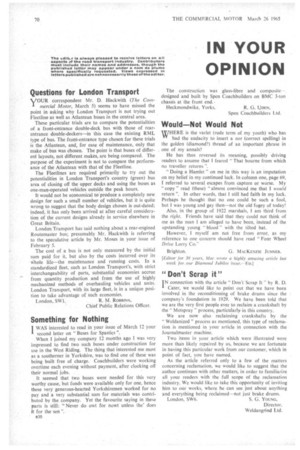IN YOUR OPINION
Page 72

If you've noticed an error in this article please click here to report it so we can fix it.
Questions for London Transport
VOUR correspondent Mr. D. Hackwith (The Colnmercial Motor, March 5) seems to have missed the point in asking why London Transport is not trying out Fleetline as well as Atlantean buses in the central area.
These particular trials are to compare the potentialities of a front-entrance double-deck bus with those of rearentrance double-deckers—in this case the existing RML type of bus. The front-entrance type chosen for these trials is the Atlantean, and, for ease of maintenance, only that make of bus was chosen. The point is that buses of different layouts, not different makes, are being compared. The purpose of the experiment is not to compare the performance of the Atlantean with that of the Fleetline.
The Fleetlines are required primarily to try out the potentialities in London Transport's country (green) bus area of closing off the upper decks and using the buses as one-man-operated vehicles outside the peak hours.
It would not be economical to produce a completely new design for such a small number of vehicles, but it is quite wrong to suggest that the body design chosen is out-dated; indeed, it has only been arrived at after careful consideration of the current designs already in service elsewhere in Great Britain.
London Transport has said nothing about a rear-engined Routemaster bus; presumably Mr. Hackwith is referring to the speculative article by Mr. Moses in your issue of February 5.
The cost of a bus is not only measured by the initial sum paid for it, but also by the costs incurred over its Whole life—the maintenance and running costs. In a standardized fleet, such as London Transport's, with strict interchangeability of parts, substantial economies accrue from quantity production and from the use of highly mechanized methods of overhauling vehicles and units. London Transport, with its large fleet, is in a unique position to take advantage of such economies.
London, SW1. R. M. ROBBINS, Chief Public Relations Officer.
Something for Nothing
I WAS interested to read in your issue of March 12 your second letter on "Buses for Spastics ".
When I joined my company 12 months ago I was very impressed to find two such buses under construction for use in the West Riding. The thing that interested me most as a southerner in Yorkshire, was to find one of these was being built free of charge. Coachbuilders were working overtime each evening without payment, after clocking off their normal jobs.
It seemed that two buses were needed for this very worthy cause, but funds were available only for one, hence these very generous-hearted Yorkshiremen worked for no pay and a very substantial sum for materials was contributed by the company. Yet the favourite saying in these parts is still: "Never do owt for nowt unless the' does it for the sen ".
a30 The construction was glass-fibre and compositedesigned and built by Spen Coachbuilders on BMC 3-ton chassis at the front end. •
Heckmondwike, Yorks. R. G. UDEN,
Spen Coachbuilders Ltd.
Would—Not Would Not
WHERE is the varlet (rude term of my youth) who has had the audacity to insert a not (correct spelling) in the golden (diamond?) thread of an important phrase in one of my annals?
He has thus reversed its meaning, possibly driving readers to assume that I feared "That bourne from which no traveller returns ".
"Doing a Hamlet" on me in this way is an imputation on my belief in my continued luck. In column one, page 69, I referred to several escapes from capture or worse. My " copy " read (these) "almost convinced me that I would return ". In other words, that I still had faith in my luck. Perhaps he thought that no one could be such a fool, but 1 was young and gay then—not the old fogey of today!
Also, in the group of 1922 marshals, I am third from the right. Friends have said that they could not think of me as the man I am alleged to have been, instead of the upstanding young blood" with the tilted hat.
However, I myself am not free from error, as my reference to one concern should have read "Four Wheel Drive Lorry Co: Brighton. G. MAcKENztE JuNNER.
[Editor for 30 years, Mac wrote a highly amusing article last week /or.. our Diamond Jubilee irsue.— ED]
"Don't Scrap it"
I N connection with the article "Don't Scrap It by R. D. Cater, we would like to point out that we have been involved in the reconditioning of brake drums since the company's foundation in 1929. We have been told that we are the very first people ever to reclaim a crankshaft by the " Metspray " process, particularly in this country.
We are now also reclaiming crankshafts by the Weldanized " process as mentioned, this type of reclamation is mentioned in your article in connection with the Journalmaster machine.
Two items in your article which were illustrated were more than likely repaired by us, because we are fortunate in having this particular work from our customer, which in point of fact, you have named.
As the article referred only to a few of the matters concerning reclamation, we would like to suggest that the author continues with other matters, in order to familiarize all your readers with the full scope of the reclamation industry. We would like to take this opportunity of inviting him to our works, where he can see just about anything and everything being reclaimed—not just brake drums.
London, SW6. S. G. YOUNG, Director, Weldangrind Ltd.




























































































































